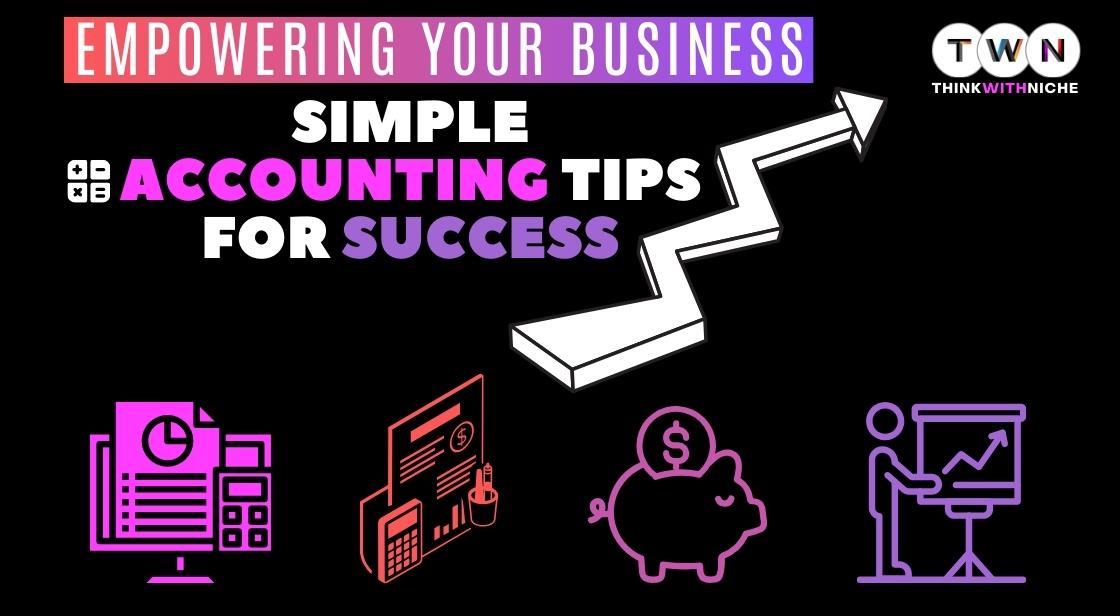Empowering Your Business: Simple Accounting Tips for Success

Blog Post
In the dynamic realm of business, robust accounting practices are fundamental to the success and growth of enterprises, whether they're startups or well-established conglomerates.
This comprehensive guide explores simple yet impactful accounting tips that can elevate your business to new heights. From understanding GAAP software capitalization to leveraging modern accounting software, staying abreast of tax laws, and embracing continuous learning, these insights offer a strategic approach to financial management.
Additionally, we delve into the significance of regularly reconciling accounts, separating personal and business expenses, and the innovative use of tools like photo book portfolios for effective data organization.
As we journey through these tips, it becomes evident that accounting is not merely a mandatory function but a potent instrument for achieving sustainable growth, informed decision-making, and overall business success.
In the world of business, accounting often forms the backbone of all operations. Whether you're running a startup or an established conglomerate, solid accounting practices can drive your company to new heights.
In this guide, we'll delve into some simple yet powerful accounting tips that can make a world of difference for your business.
Understand GAAP Software Capitalization
In the realm of accounting, it's essential to stay updated with the Generally Accepted Accounting Principles (GAAP). One area where this is crucial is GAAP software capitalization. According to GAAP, certain costs related to internal-use software can be capitalized or treated as an asset rather than an immediate expense.
This can enhance your balance sheet and influence key financial ratios positively. If you're in the tech sector or frequently invest in software, it's worthwhile to understand these principles thoroughly or invest in an accountant who does.
Regularly Reconcile Your Accounts
An essential habit to develop is regular account reconciliation. This involves verifying your business's financial records against those of your bank to ensure consistency and accuracy. Regular reconciliations can help spot errors, detect fraud, and ensure your financial statements are accurate.
Separate Business and Personal Expenses
For smaller businesses and startups, it might be tempting to mix personal and business finances. However, doing so can complicate your accounting and potentially lead to tax issues. Ensure you have separate bank accounts for business operations and pay any business-related expenses from the business account.
Stay Updated with Tax Laws
Tax laws and regulations are in constant flux. By staying updated, you can take advantage of tax breaks and avoid potential pitfalls. Consider attending seminars, subscribing to accounting journals, or even hiring a tax professional to stay in the loop.
Make Use of Modern Accounting Software
Today, there's a plethora of software options tailored to various business needs. Such tools can automate mundane tasks, reduce errors, and offer insightful reports. Investing in reliable accounting software can free up your time and offer insights into your business's financial health.
Analyzing Key Financial Metrics: A Snapshot
|
Financial Metric |
2019 |
2020 |
2021 |
What It Indicates |
|
Current Ratio |
1.8 |
1.7 |
2.0 |
Ability to cover short-term liabilities |
|
Debt-to-Equity Ratio |
0.6 |
0.5 |
0.4 |
Amount of debt compared to shareholders' equity |
|
Gross Margin |
32% |
30% |
33% |
Sales profitability excluding overhead costs |
|
Return on Assets (ROA) |
8% |
7% |
9% |
Efficiency in using assets to generate profit |
Data Source: Sample Corp Financial Reports
This table showcases a sample analysis of key financial metrics over the years. Keeping an eye on such metrics helps businesses understand their financial performance and make informed decisions.
Embrace Continuous Learning
In the ever-evolving world of business and finance, continuous learning is a must for anyone engaged in accounting. This not only ensures that you remain at the forefront of the latest accounting methods and best practices, but it also allows you to offer the best possible financial advice and direction for your business. Consider:
-
Online Courses: Numerous platforms offer specialized courses in accounting, from basic to advanced.
-
Workshops: Local chambers of commerce and professional organizations frequently hold workshops.
-
Networking: Joining groups such as the American Institute of CPAs (AICPA) can provide invaluable learning from peers.
Maintain a Robust Filing System
A solid filing system is the backbone of organized accounting. With the influx of invoices, receipts, payroll details, and other financial documents, it's easy to become overwhelmed without a logical system in place. Consider going digital where possible.
Digital systems, often backed by cloud storage, not only reduce physical clutter but also make data retrieval faster and more efficient. Moreover, they often come with added layers of security, ensuring your financial data remains confidential and protected.
Also Read: Effective Vastu Tips to Grow Your business
Plan for the Future with Forecasting
While keeping accurate records of the past is crucial, a proactive approach to accounting involves looking to the future. Financial forecasting allows businesses to anticipate future expenses and revenues, aiding in budgeting and strategic planning.
By analyzing past trends and considering external economic factors, companies can set realistic financial goals, anticipate challenges, and capitalize on potential opportunities.
Periodically revisiting and adjusting these forecasts ensures the business remains on track and can pivot quickly when unforeseen challenges arise.
Organize With Key Information
Accounting isn't just about numbers; it's about presenting data in a way that's easily digestible for stakeholders. Many top-tier accountants have adopted the innovative approach of compiling vital company information in a photo book portfolio.
Not only does this provide a tangible record of the company's financial journey, but it also makes for a visually appealing and easily understandable format. Whether you're meeting potential investors or simply reviewing the year's accomplishments, a photo book can tell your company's story like no spreadsheet can.
In The End…
Accounting, when done right, is more than just a mandatory business function; it's a powerful tool for growth, strategy, and success. By adopting best practices like understanding GAAP software capitalization, organizing data effectively with tools like photo book portfolios, and staying updated with ever-evolving tax laws, businesses can set themselves up for lasting success.
You May Like
EDITOR’S CHOICE












